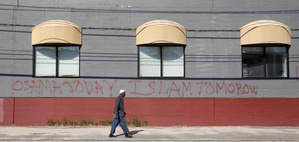Many have suggested that relief would have been more appropriate than jubilant celebration. Many left-leaning folks have been criticized for rejoicing in death. I feel the need to clarify that I am not an apologist for bin Laden or any other terrorist. I have the deepest sympathy for any and all people who lost loved ones on September 11, 2001 and in any subsequent military operations. However, just because 9/11 was wrong, it does not make military action or retaliation right.
I have been troubled by the lack of recognition for the context and history of bin Laden and US foreign policy by the general American population and mainstream media. Putting aside the controversy surrounding the 1979 US funding bin Laden and other militants against the Soviets in Afghanistan, there remain several problematic aspects to the decade-long "War on Terror" and its casualties. I have also been troubled by the assertion that the "War on Terror" will continue, made by both Obama and Secretary of State Hillary Clinton:
Here at the State Department, we have worked to forge a worldwide anti-terror network. We have drawn together the effort and energy of friends, partners, and allies on every continent. Our partnerships, including our close cooperation with Pakistan, have helped put unprecedented pressure on al-Qaida and its leadership. Continued cooperation will be just as important in the days ahead, because even as we mark this milestone, we should not forget that the battle to stop al-Qaida and its syndicate of terror will not end with the death of bin Ladin.
Indeed, we must take this opportunity to renew our resolve and redouble our efforts. In Afghanistan, we will continue taking the fight to al-Qaida and their Taliban allies, while working to support the Afghan people as they build a stronger government and begin to take responsibility for their own security.
According to Unknown News, based on the "lowest credible estimates," over 19,500 people have been killed and over 48,500 people have been injured in the Afghan War. Obviously, only one of those killed was bin Laden, but thousands of those killed were Afghan civilians. Does the end (bin Laden's death), justify the means (the deaths of thousands)? This includes thousands of Afghans AND Americans, as well as journalists and coalition forces, especially from the UK, Canada, France and Germany. Not to mention the numerous soldiers and others impacted physically and mentally, suffering from PTSD (post-traumatic stress disorder), physical disabilities, committing suicide, or grieving their loved ones.
Russell Hodin NEW TIMES San Luis Obispo May 5, 2011 |
Obviously, the loss of American lives on 9/11 was tragic, but shouldn't death prompt reflection on life? Can we not use war and terror as an opportunity to reflect on, and strive for, peace?
The big picture of the war is important. But the big picture of the terrorist attacks of 9/11 is also crucial to understanding this conflict. When I heard about the World Trade Center (WTC) attacks in New York, I was horrified. But in the aftermath, I hoped that a faint silver lining might be a time of national reflection for Americans, to ask: Why do people want to attack our country? What does the attack on the WTC signify?
When this type of reflection did not reach the White House, I hoped that at least other government officials and media outlets would question whether or not fighting fire with fire (or violence with violence... or terror with terror) would be wise.
There was one voice in government, Rep. Barbara Lee, that offered that wisdom:
There was another voice that ended up on FOX News' The O'Reilly Factor and managed to make the point that I'm trying to make before O'Reilly unprofessionally said "cut his mic" and moved on.
 |
| By Eneko in Diagonal Periódico |
Them (noun): Not us; the Other.
This short chapter by Andrea Smith (worth reading the whole 8 pages!) clearly explains how the significance of War against the Other and is worth quoting at length:
Ridiculous discussions about "terror babies," babies born and raised as terrorists/American citizens, and widespread Islamaphobia, have become routine in the US over the past decade.Orientalism/War
A third pillar of white supremacy is the logic of Orientalism. Orientalism was defined by Edward Said as the process of the West defining itself as a superior civilization by constructing itself in opposition to an "exotic" but inferior "Orient." (Here I am using the term "Orientalism" more broadly than to solely signify what has been historically named as the Orient or Asia.) The logic of Orientalism marks certain peoples or nations as inferior and as posing a constant threat to the well-being of empire. These peoples are still seen as "civilizations"-they are not property [i.e. slaves] or "disappeared" [i.e. indigenous peoples] - however, they will always be imaged as permanent foreign threats to empire. This logic is evident in the anti-immigration movements within the United States that target immigrants of color. It does not matter how long immigrants of color reside in the United States, they generally become targeted as foreign threats, particularly during war time. Consequently, Orientalism serves as the anchor for war, because it allows the United States to justify being in a constant state of war to protect itself from its enemies.
Trigger Warning: this video will likely make you angry. It contains so much misdirected hatred and unacceptable verbal attacks on Muslim-Americans, from both politicians and citizens.
If this isn't terrorism, then I'm not sure I know what terrorism is.
So, let's connect this to bin Laden's death. This graffiti, vandalizing a mosque in Maine, reads:
OSAMA TODAY ISLAM TOMOR[R]OW
 |
| via Valerie Kau |
